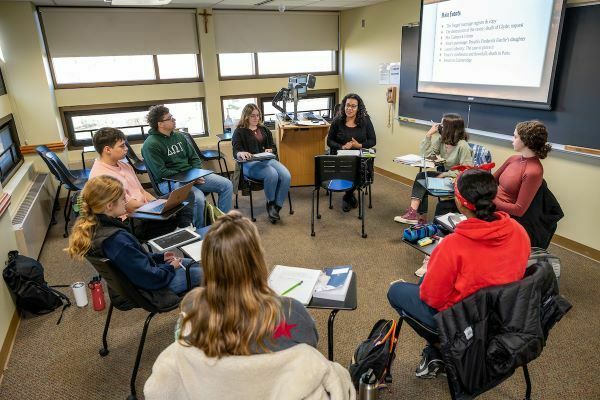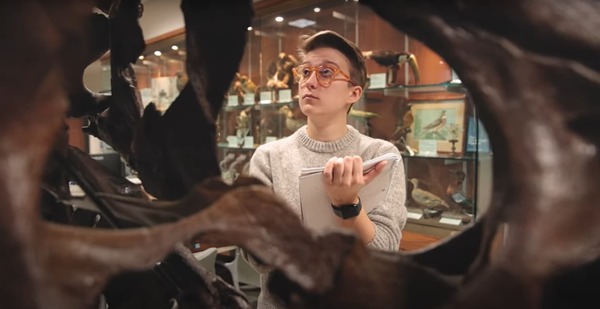Requirements
Major requirements
The English major requires a minimum of 10 courses (30 credit hours). In taking these courses, students must complete the following requirements:

Gateway Course: Introduction to Literary Studies
1 course (3 credits)
This course provides beginning English majors with experience in the analysis, interpretation, and appreciation of literary works of different kinds and eras. Texts assigned will vary from one section to another. Works studied will introduce students to the practice of critical argument and will develop techniques for analysis of criticism as well as literature.
Cultures courses
2 courses (6 credits)
Cultures courses explore perspectives on cultural difference. These subject areas may include global Anglophone literature, literature translated into English, and the creative and critical work of historically marginalized and understudied groups. Courses may focus on borders, migration and diasporas, colonialism, counter-cultural movements, civil rights, race, gender, religious minorities, sexual orientation, disability, citizenship, community, and class and socio-economic status, among other topics.
At least one course must have a race, ethnicity, or indigeneity (REI) designation
Methods, Forms, and Genres course
1 course (3 credits)
Students will receive a grounding in one or more genres, critical methodologies, and/or analytical frameworks for the study of literature. Methods courses will include, for example, courses in creative writing, literary theory, digital humanities, performance studies, and disability studies, and courses using genre as an analytical framework (e.g. a course on prose, a course on poetry, a course on drama).
Histories of Literature courses
3 courses, 2 of which must be focused on pre-1800 periods (9 credits)
Histories of Literature courses explore literatures in English from earlier periods, or have an emphasis on how historical forces give shape and texture to literary texts, or how literature changes history. This category includes courses that focus on one specific literary period, or on particular authors, and courses with a transhistorical thematic focus, such as adaptation, literary legacies, and the afterlives of authors or texts.
Three additional English courses
The three elective courses can be any course within the Department of English.
If you have questions about the requirements, contact:
Laura Betz
Director of Undergraduate Studies
lbetz@nd.edu
Creative Writing Concentration

In creative writing, we make stories. We study stories. We craft language into poetry, creative nonfiction, and fiction. We do a lot more, of course — like exploring the intersection of psychology and history and culture, thinking about the politics of style, and paying close attention to the astonishing world around us — but whether you’re crafting sonnets or science fiction, the real heart of what we do is magic: building worlds out of words. Through literary study and craft-based workshops, our writers work to master skills like narrative construction, rhythm, worldbuilding, imagery, metaphor, and characterization, while also closely reading literatures from around the world.
Biology, economics, business, advertising, politics, particle physics, theology, engineering — nearly every aspect of human life happens in language. But there’s only one discipline on this campus that studies the art and craft of shaping language into reality: creative writing.
Requirements
5 Literary Courses (15 credits)
Gateway Course: Introduction to Literary Studies
1 course (3 credits)
This course provides beginning English majors with experience in the analysis, interpretation, and appreciation of literary works of different kinds and eras. Texts assigned will vary from one section to another. Works studied will introduce students to the practice of critical argument and will develop techniques for analysis of criticism as well as literature.
Cultures courses
2 courses (6 credits)
Cultures courses explore perspectives on cultural difference. These subject areas may include global Anglophone literature, literature translated into English, and the creative and critical work of historically marginalized and understudied groups. Courses may focus on borders, migration and diasporas, colonialism, counter-cultural movements, civil rights, race, gender, religious minorities, sexual orientation, disability, citizenship, community, and class and socio-economic status, among other topics.
At least one course must have a race, ethnicity, or indigeneity (REI) designation
Histories of Literature courses
2 courses, 1 of which must be focused on a pre-1800 period (6 credits)
Histories of Literature courses explore literatures in English from earlier periods, or have an emphasis on how historical forces give shape and texture to literary texts, or how literature changes history. This category includes courses that focus on one specific literary period, or on particular authors, and courses with a transhistorical thematic focus, such as adaptation, literary legacies, and the afterlives of authors or texts.
Creative Writing courses
4 courses, 12 credits
The courses should include:
- No more than one 20xxx-level ("Intro to") course.
- One 40xxx-level advanced course in either poetry, fiction, or creative nonfiction.
- Two different genres (poetry, fiction, creative nonfiction).
Creative Writing courses toward the concentration may also include:
- Creative Writing in Ireland
- Advanced Fiction Writing;
- Advanced Poetry Writing;
- Special Topics in Creative Writing.
- Other creative writing courses may also count towards the concentration; please consult with the Creative Writing Director to confirm that the course you wish to take counts for the concentration.
One additional English course
The additional elective course can be any English major course within the Department of English.
Ready? Apply for the creative writing concentration.
Interested in writing a creative writing thesis? Consider the creative writing honors concentration.